What Was The Supreme Court Case Of Korematsu Vs. Us
Korematsu v US Supreme Court Case 1. What is the background to the Korematsu case.
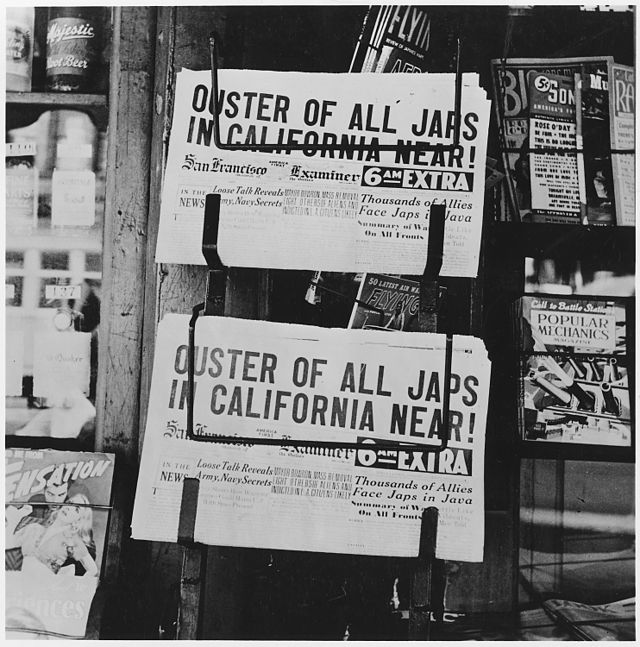
Student Showcase Liberty Revoked Korematsu V The United States Not Even Past
The Japanese citizens were shipped off to.

What was the supreme court case of korematsu vs. us. In this 6-3 decision each dissenting justice wrote an opinion addressing the flaws in the majority opinion. As is the case with the exclusion order here that prior curfew order was designed as a protection against espionage and against sabotage In Kiyoshi Hirabayashi v. Supreme Court case Korematsu V.
We will write a custom Essay on The Case Korematsu v. Korematsu had been arrested by the FBI for failing to report for relocation and was convicted in federal court in September 1942. Read the following document which contains the concurring and dissenting.
214 1944 Case Summary of Korematsu v. United States Korematsu v United States - the US. Citizens from their homes on the West Coast to internment camps in remote areas of western and midwestern states during World War II.
The Court agreed with government and stated that the need to protect the country was a greater priority than the individual rights of the people of Japanese descent forced into internment camps. 6-3 favor United States Related constitutional issueamendment. 1774 we sustained a conviction obtained for violation of the curfew order.
World War II officially began in Europe on September 1 1939 when Germany invaded Poland. The Ninth Circuit affirmed Korematsus conviction. United States Year.
Supreme Court case Korematsu vs. United States 1944 the Supreme Court in a 6-3 vote upheld the governments forceful removal of 120000 people of Japanese descent 70000 of them US. Supreme Court in a sharply divided 63 decision upheld Korematsus conviction in.
Supreme Court on December 18 1944 upheld 63 the conviction of Fred Korematsua son of Japanese immigrants who was born in Oakland Californiafor having violated an exclusion order requiring him to submit to forced relocation during World War II. Korematsu an American citizen of Japanese ancestry violated one particular order pursuant to the Executive. Supreme Court on December 18 1944 upheld 63 the conviction of Fred Korematsua son of Japanese immigrants who was born in Oakland Californiafor having violated an exclusion order requiring him to submit to forced relocation during World War II.
United States 1944 Argued. Fred Toyosaburo Korematsu who refused to leave his home in San Leandro California was convicted of violating Exclusion Order Number 34 and became the subject of a test case to challenge the constitutionality of. The Hirabayashi conviction and this one thus rest on the same 1942.
United States 320 US. Korematsu a Nisei an American-born person whose parents were born in Japan. Landmark Supreme Court case concerning the incarceration of Japanese Americans during World War II.
Supreme Court of the United States Author. December 18 1944 Rehearing Denied Feb. Is an example of the importance and the historical impact of what often are called fiery dissents.
He responded by arguing that Executive Order 9066 violated the Fifth Amendment. When the Supreme Court Justified Japanese Internment Camps Korematsu v. Korematsu V United States 323 Us 214 1944 50 Most Cited Cases partner.
United States illustrates that the principles imbedded in the Constitution of the United States can be violated or at least misinterpreted especially at the time when the country has to cope with a threat to national security. In writing the dissenting opinion of the Supreme Court decision in Korematsu v. All residents of this nation are kin.
Korematsu was arrested and convicted of violating the order. United States legal case in which the US. Street Law Case Summary 2020 Street Law Inc.
United States in which the court ruled 6-3 that Japanese internment camps were necessary for the. United States a decision that historians and legal experts alike have since argued was. A Japanese-American man living in San Leandro Fred Korematsu chose to stay at his residence rather than obey the order to relocate.
The two sides fighting were the. Peter Irons and Karen Korematsu talked about the 1944 US. United States Supreme Court.
Supreme Court Case legalizing Japanese InternmentLoyal Page 570. President Roosevelts Executive Order in response to Pearl Harbor called for the detention of American citizens of Japanese ancestry on the West Coast of the US. Korematsu appealed to the US.
The case Korematsu v. United States a case brought by Fred T. Supreme Court ruled against Korematsu and backed the governments action in Korematsu v.
US Justice Murphy concluded by stating. In Korematsu v. Answer the following questions.
The Court supported the government and said that the need to protect against espionage outweighed Korematsus rights. United States 323 US. 1430 into video Korematsu v.
Everything must be cited with MLA NOT APA. 12 1945 See 324 US. - Court cases.
United States legal case in which the US. Amendment 5 Civil rights or Civil liberties. United States legal case in which the US.
Supreme Court on December 18 1944 upheld 63 the conviction of Fred Korematsua son of Japanese immigrants who was born in Oakland Californiafor having violated an exclusion order requiring him to submit. In 1944 the US. Civil Rights SignificancePrecedent.
Opinions in the US. United States Call NumberPhysical Location.
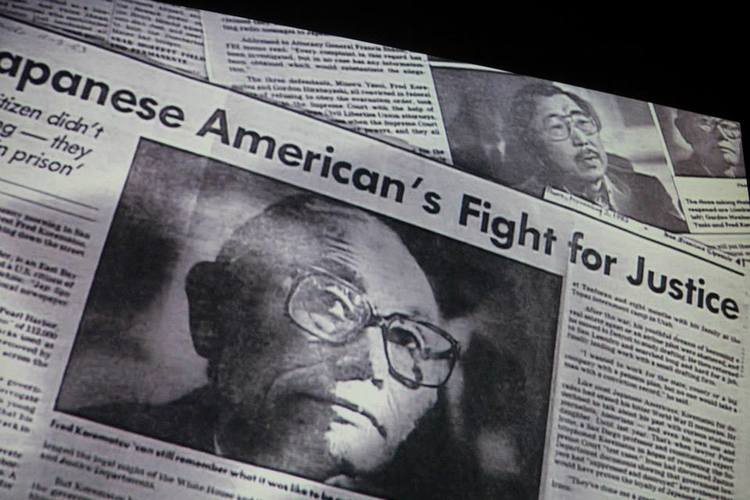
Korematsu V United States A Chronology

Korematsu Decision Finally Rejected By Supreme Court Cnn Politics

Korematsu V United States National Security Outweighs Individual Rights
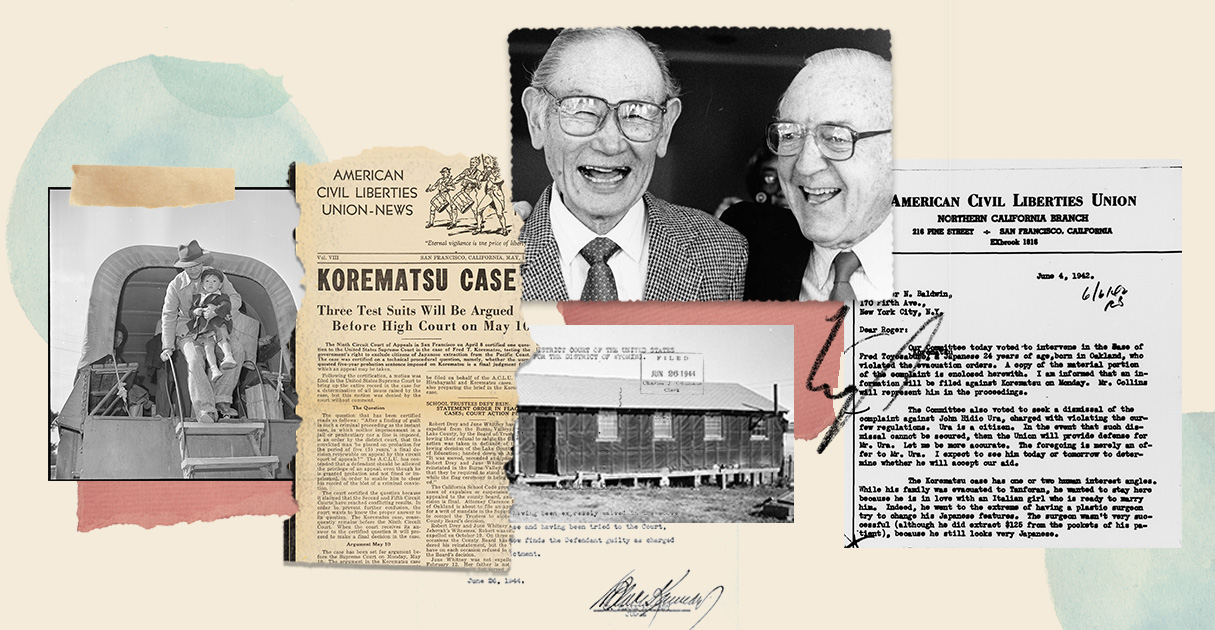
Exploring The Aclu News Archive Korematsu V United States Aclu Of Northern Ca
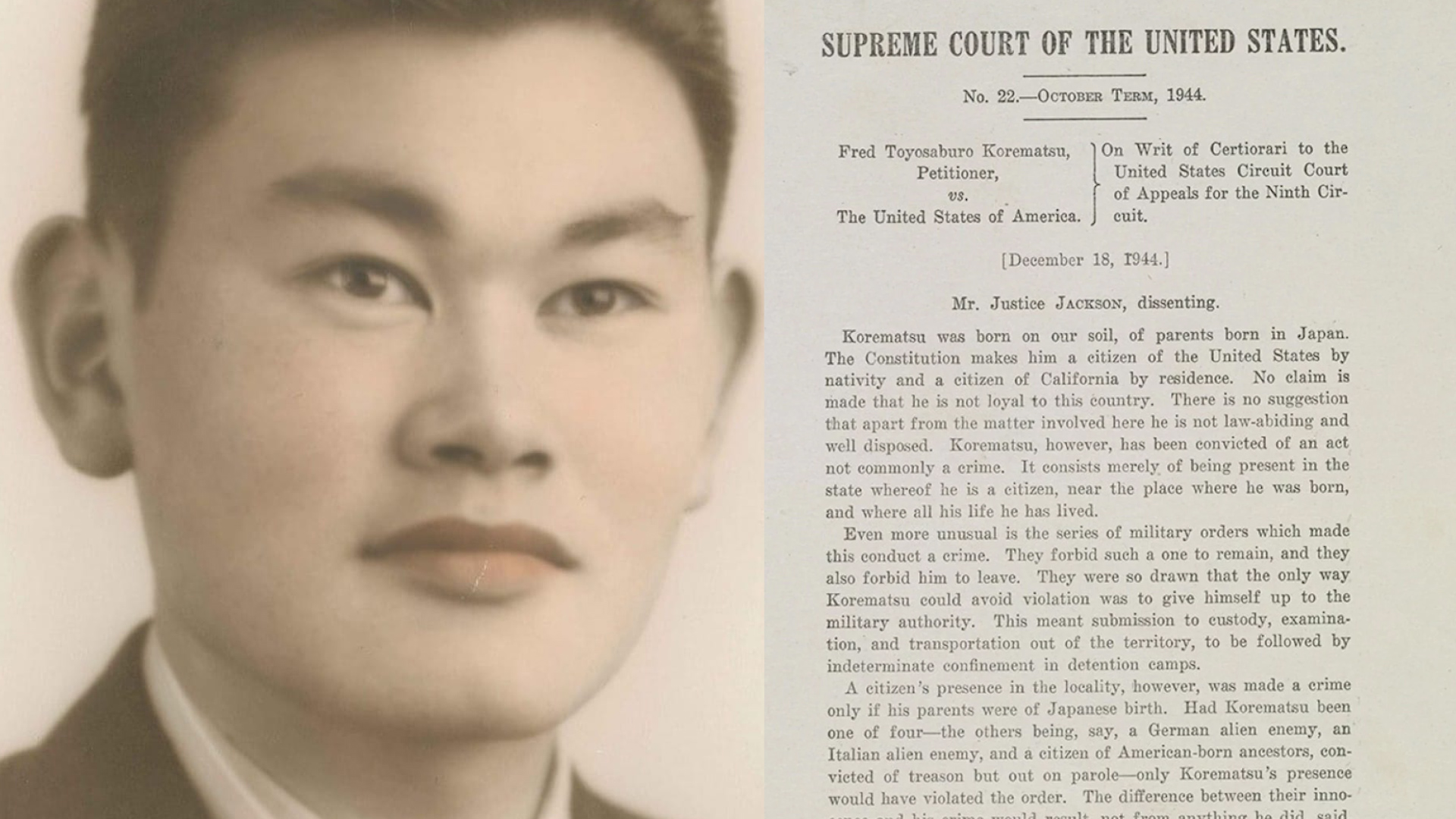
Supreme Court Vindicates Fred Korematsu But Repeats Ugly History Karen Korematsu Says The Washington Post

An Introduction To Constitutional Law Korematsu V United States
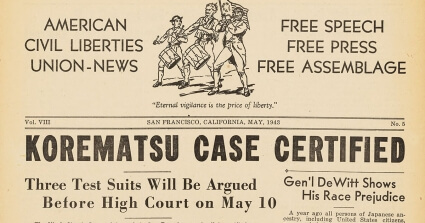
Exploring The Aclu News Archive Korematsu V United States Aclu Of Northern Ca

Korematsu Vs United States Explained Us History Review Youtube
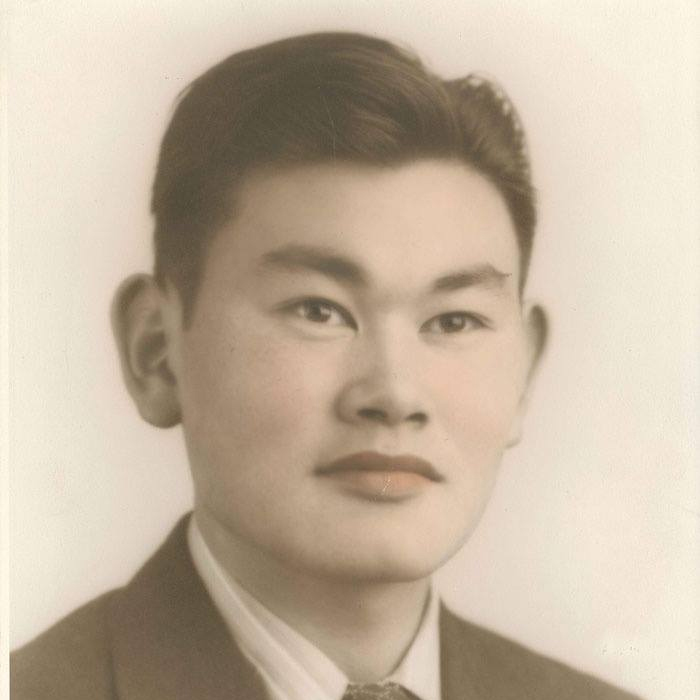
May 30 1942 Fred Korematsu Arrested Zinn Education Project

Korematsu Ruling On Japanese Internment Condemned But Not Overruled History

A Discredited Supreme Court Ruling That Still Technically Stands The New York Times
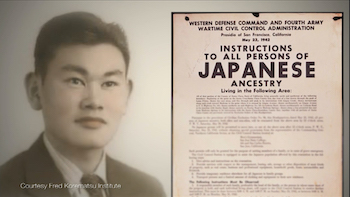
Korematsu V The United States Is Decided African American Registry
Conclusion Korematsu V United States Fighting For Rights Facing Responsibilities

Korematsu V United States Students Britannica Kids Homework Help
Welcome To The Asian American Studies Center

Pop Civ 8 Korematsu V United States Http Www Johnmarshallcenter Org

Amazon Com Korematsu V United States Japanese America Internment Camps Landmark Supreme Court Cases 9780894909665 Alonso Karen Books

When The Supreme Court Justified Japanese Internment Camps Korematsu V United States Youtube
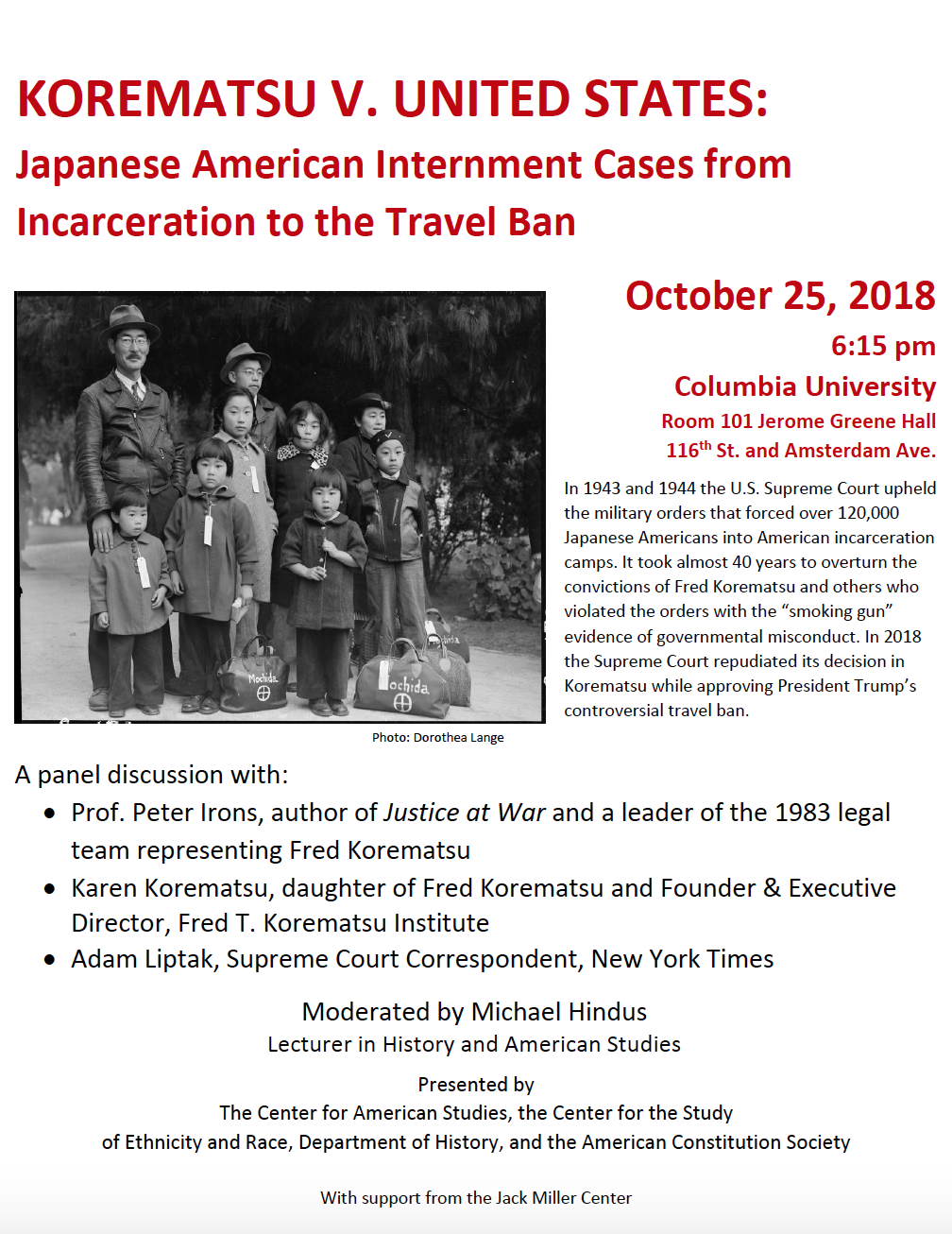
Korematsu V United States Japanese American Internment Cases From Incarceration To The Travel Ban Center For American Studies
Komentar
Posting Komentar